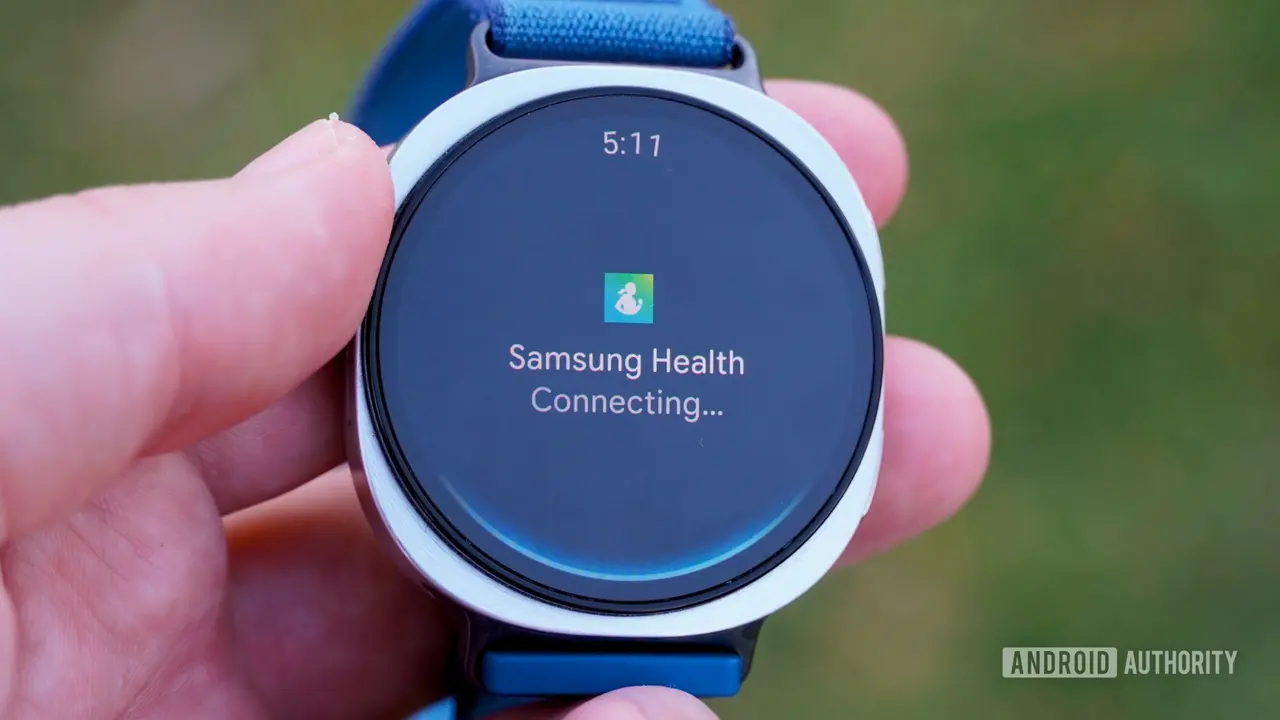Samsung Partners with Stanford to Enhance Galaxy Watch's Sleep Apnea Features Using AI
2 Sources
2 Sources
[1]
Your Galaxy Watch could get a major sleep apnea upgrade, thanks to AI and Stanford
Here's how Stanford and Samsung are using AI to turn the Galaxy Watch into a more helpful sleep apnea monitor. Your next Galaxy Watch could do more than simply diagnose sleep apnea, thanks to a recent partnership with Stanford University. Samsung announced on Tuesday that the tech giant is teaming up with Stanford Medicine to enhance its obstructive sleep apnea feature on the smartwatch. Also: The best smartwatches: Expert tested and reviewed The partnership's goal is to uncover ways and features that could not only recognize sleep apnea in a Galaxy Watch wearer but also provide meaningful insights for managing the condition. The tech brand plans to use AI to further this goal. Samsung's obstructive sleep apnea feature has received de novo classification, a regulatory pathway that authorizes new health devices that are not created upon a "predicate device," from the US Food and Drug Administration. By late April, the feature will be available in 29 markets globally, according to the press release. Reports estimate that over 30 million people in the US suffer from sleep apnea, and it is a condition that is often underdiagnosed. That explains why several tech brands, including Apple, OnePlus, and Samsung, have created insights and detections in their smartwatches that spot sleep apnea, making symptom spotting and diagnosis accessible for more people. Apple's Series 10 and Ultra 2 Apple Watch gained FDA clearance for the feature last year, and OnePlus is aiming to do the same with its Watch 3. Also: Your next smartwatch could have a feature that transforms healthcare "The ethical, equitable and evidence-based use of technology, after its validation through research is crucial in developing new approaches to detection and management of sleep apnea and other serious sleep-related health conditions," said Robson Capasso, MD, FAASM, Chief of Sleep Surgery, Professor of Otolaryngology and Head and Neck Surgery, former Associate Dean of Research, Stanford University School of Medicine. The focus on condition management, compared to condition detection, is reflective of a greater trend within the wearables space. Thanks to advancements in AI, tech brands can now develop and deploy features that detect all sorts of conditions, from atrial fibrillation to sleep apnea. Where the wearables space is headed, however, is more toward symptom management. Also: How Google is using AI to improve its medical advice reputation We can see this most clearly through the AI doctors these brands are working on or deploying. All these advancements lead to what Samsung's head of digital health referred to as "a comprehensive system that supports you through every stage of your health journey," during its Samsung Unpacked event. Also: What if AI ran ER triage? Here's how it sped up patient care in real-world tests "Our vision is to develop a comprehensive system that supports you through every stage of your health journey," said Praveen Raja. "From measuring your current health to giving you personalized health insights and coaching, and connecting you with providers and caregivers." Get the morning's top stories in your inbox each day with our Tech Today newsletter.
[2]
Samsung's Galaxy Watch sleep apnea detection could get a big future boost from AI
It hopes to use AI to go beyond detection and develop sleep apnea management technology Samsung has announced ambitious plans to take the sleep apnea features of its Galaxy Watch range beyond detection, possibly using AI to one day power sleep apnea management. Announced on April 8, Samsung has partnered with Stanford University and Stanford Medicine to conduct a research project into "an innovative health solution based on Samsung's obstructive sleep apnea feature." Samsung says the study is designed "to explore potential ways to further enhance Samsung's Sleep Apnea feature to better support sleep health through timely interventions." According to Samsung, the company wants to move beyond detection, the current functionality offered by devices like the Samsung Galaxy Watch Ultra and Galaxy Watch 7, and toward technology that can help users manage the condition. Perhaps most excitingly, Samsung specifically mentions AI technology, which it hopes to leverage in this pursuit, "empowering users with the best possible sleep tools to improve their health". Samsung also noted that its sleep apnea feature was recently certified in Brazil and will roll out to the country in April to bring the total number of supported territories to 29. The feature is designed to help spot and detect sleep apnea earlier to prevent long-term complications, a noble goal shared by Apple, which added sleep apnea detection to its best Apple Watch models last year. According to estimates, sleep apnea affects more than one billion people worldwide, mostly undetected. Sleep apnea is a condition where the body briefly stops breathing during sleep, cutting off oxygen to the body. Undiagnosed, it can cause more significant health complications such as hypertension, Type 2 diabetes, and cardiac issues. It sounds like Samsung's ambitions extend beyond mere detection, with future sights set clearly on monitoring the condition or perhaps even preventing it in the first place. In more immediate Galaxy Watch news, we're expecting a new Galaxy Watch 8 and possibly a classic model to debut sometime this summer.
Share
Share
Copy Link
Samsung collaborates with Stanford Medicine to improve its Galaxy Watch's sleep apnea detection and management capabilities, leveraging AI technology for more comprehensive health monitoring.

Samsung and Stanford Join Forces to Revolutionize Sleep Apnea Detection and Management
Samsung has announced a groundbreaking partnership with Stanford University and Stanford Medicine to enhance the sleep apnea features of its Galaxy Watch series. This collaboration aims to leverage artificial intelligence (AI) to not only improve the detection of obstructive sleep apnea but also develop innovative management solutions for users
1
.The Current Landscape of Sleep Apnea Detection
Sleep apnea, a condition affecting over 30 million people in the US and more than one billion worldwide, is often underdiagnosed. This prevalent sleep disorder, characterized by brief interruptions in breathing during sleep, can lead to serious health complications if left untreated
2
.Several tech companies, including Samsung, Apple, and OnePlus, have recognized the importance of accessible sleep apnea detection. Samsung's obstructive sleep apnea feature has recently received de novo classification from the US Food and Drug Administration, paving the way for its deployment in 29 markets globally by late April
1
.AI-Powered Advancements in Sleep Health
The partnership between Samsung and Stanford Medicine represents a significant step forward in wearable health technology. By harnessing the power of AI, the collaboration aims to transform the Galaxy Watch from a simple diagnostic tool into a comprehensive sleep health management system
1
.Dr. Robson Capasso, Chief of Sleep Surgery at Stanford University School of Medicine, emphasized the importance of ethical, equitable, and evidence-based use of technology in developing new approaches to sleep apnea detection and management
1
.Related Stories
Beyond Detection: The Future of Wearable Health Tech
Samsung's vision extends beyond mere detection of sleep apnea. The company aims to create a holistic health ecosystem that supports users throughout their entire health journey. Praveen Raja, Samsung's head of digital health, outlined this ambitious goal during a recent Samsung Unpacked event
1
.This shift towards condition management reflects a broader trend in the wearables industry. As AI capabilities advance, tech companies are increasingly focusing on developing features that not only detect health conditions but also provide meaningful insights and interventions for managing them
2
.The Road Ahead for Samsung's Sleep Apnea Technology
While specific details about the AI-powered sleep apnea management features are yet to be revealed, Samsung's partnership with Stanford signals a commitment to pushing the boundaries of what smartwatches can offer in terms of health monitoring and support
2
.As the research progresses, users can anticipate more sophisticated sleep apnea tools that go beyond detection, potentially offering personalized interventions and management strategies. This development could significantly impact the lives of millions suffering from sleep apnea, providing them with accessible and continuous support for better sleep health
1
2
.References
Summarized by
Navi
Related Stories
Samsung Galaxy wearables will detect early signs of dementia using AI-powered brain health monitoring
05 Jan 2026•Technology

Samsung Unveils Galaxy Watch8 Series: AI-Powered Health Features and Sleek Design
10 Jul 2025•Technology

Samsung Health to Introduce AI-Powered Assistant for Personalized Fitness Guidance
17 Sept 2025•Technology

Recent Highlights
1
OpenAI secures $110 billion funding round from Amazon, Nvidia, and SoftBank at $730B valuation
Business and Economy

2
Anthropic stands firm against Pentagon's demand for unrestricted military AI access
Policy and Regulation

3
Pentagon Clashes With AI Firms Over Autonomous Weapons and Mass Surveillance Red Lines
Policy and Regulation





